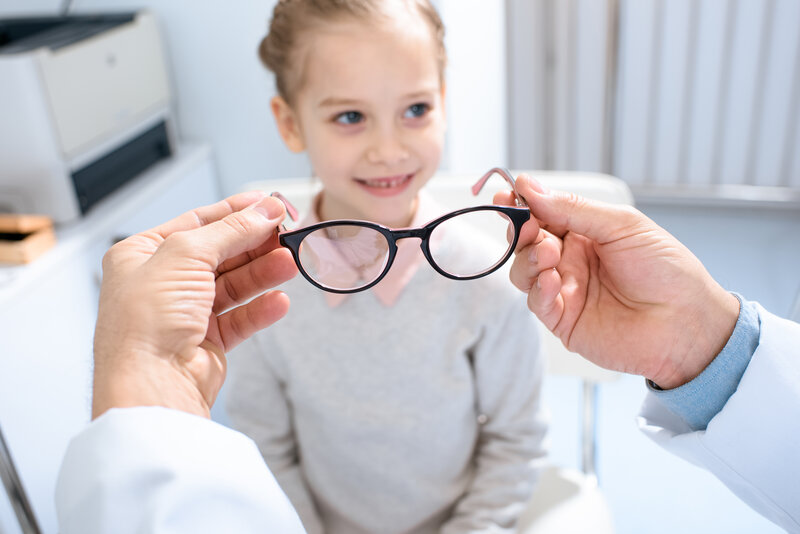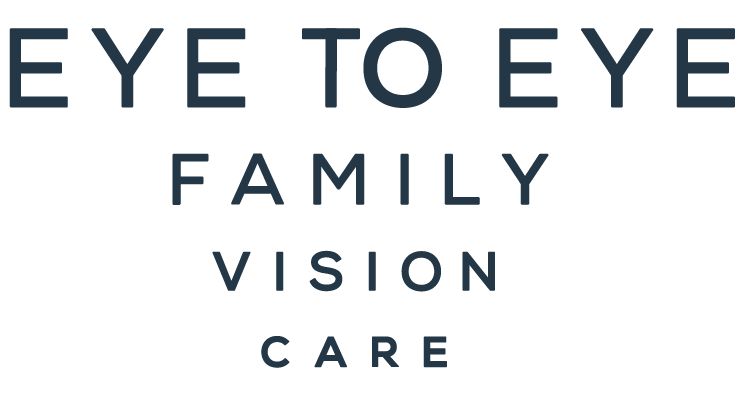Signs Your Child Needs Glasses

Scheduling an eye exam with a family optometrist is the only way to know for sure whether a child needs glasses. The American Optometric Association (AOA) recommends children have their eyes examined at least once between the ages of three and five years old; once they start school, children should have a complete eye exam once a year.
Your Child Needs Glasses If…
Children are highly adaptable, so they adjust to their lack of - or declining - vision better than adults do. This is why an annual, back-to-school eye exam is the most proactive way to support your children’s vision health.
Rather than verbalizing that things are blurry or they can’t see as clearly as they used to, they typically show signs of needing glasses via body language and other cues.
Here are some of the most common signs a child strains to focus.
They squint
Is your child squinting - even when indoors or out of direct sunlight? Squinting is a sure sign the eyes are working harder than they need to as they try to bring things into focus. If they squint when they’re reading, they are probably farsighted. This is very common for younger children, and reading glasses do the trick. Some children actually grow out of it as their eye muscles and coordination grow stronger with age.
If they’re squinting to read the whiteboard at school, while watching TV, or when you’re driving in the car, they may be nearsighted. A child who squints often may have astigmatism (everything is blurred) or another condition causing vision loss.
They wink or cock their head to the side
We see this sign most often in younger children - toddlers and preschool age. Winking or cocking the head to the side to see properly indicates that one eye is stronger than the other. This might be a sign of a lazy eye or crossed eyes, which are almost always treatable while the child is still young.
Needing things to be “too close” to see them
Most of us grew up hearing that sitting too close to the TV damages the eyes. This is a myth, but it is definitely a sign that a person may need glasses. If you notice your child holds books really close to their face while reading, or they need to be closer than usual to a tablet or TV screen to see, they should have their vision checked.
Frequent headaches
Headaches are a sign of eye strain and should be evaluated immediately. Sometimes, eye strain is simply a sign that someone isn’t taking adequate screen breaks or is reading in low lighting. However, it could also mean the person requires prescription lenses.
Children may not know the term headache or how to verbalize what they’re feeling, so they may also say things like:
- My head feels tired.
- I get dizzy when I read.
- My eyeballs hurt.
Listen for the small cues that could be a way of communicating eye strain.
Chronic eye rubbing
Eye rubbing is another common sign of tired or strained eyes. It can also be a sign of lack of sleep or itching due to allergies or an eye infection. If you know your child is healthy and generally well-rested, frequent eye rubbing may be their unconscious “tell,” indicating their eyes are tired, achy, or blurry.
It’s also worth mentioning that chronic eye rubbing is not good for the eyes. It may provide temporary relief but also puts the eyes at risk for micro-scratches and abrasions. Over time, this makes eyes more prone to infection and corneal abrasions, which are more serious and can cause vision loss.
Struggling at school (reading, concentrating, behavioral, etc.)
When a child can’t see well it often shows up in the classroom. The inability to see clearly makes it harder for a child to:
- Understand the visual learning aids used by a teacher such as the white board, projector, or written prompts.
- Feel competent in the classroom, which can lead them to feel like something is wrong with them.
- Pay attention because they can’t engage - making them more prone to goofing off, chatting with other children, “cheating,” or walking around out of boredom.
- Learn to read and comprehend what they’ve read.
- Stay awake in class (especially if their eyes and head feel fatigued due to eye strain).
If your child is having a hard time reading, paying attention in class, or complains that “they hate school,” a visit to the optometrist is in order. We’ll rule out any vision issues contributing to the problem.
They don’t like reading
Most kids like reading because they love becoming part of a different world or being entertained by a story. Reading inspires the imagination, a sense of curiosity, and explains feelings and experiences that children may have difficulty expressing on their own.
However, reading is not fun if it’s hard or makes your head or eyes hurt whenever you try. It’s not fun if the words are blurry or letters dance around on the page. If your child says they hate reading but love story time, think about the last time they visited the optometrist. If it’s been more than a year, schedule an eye exam ASAP. Vision issues may be blocking their ability to read with ease.
Support Your Child’s Vision With Healthy Lifestyle Choices
There is a direct correlation between healthy lifestyle choices and good vision. Children who eat unhealthy diets, lack exercise, or don’t get enough sleep are the most prone to having early vision problems. Make sure your child:
- Eats a healthy diet that is low in processed foods and sugars.
- Gets exercise at least once a day (preferably outdoors whenever possible).
- Has a stable bedtime routine, allowing them to get at least 8 to 10 hours of sleep per night.
- Knows how to manage stress (breathing, expressing feelings, talking to a trusted adult, learning how to recognize and process feelings in their body) to minimize headaches, digestive issues, or other problems that hinder their ability to thrive.
Schedule A Pediatric Eye Exam At Eye To Eye Family Vision Care
We know things get busy, and it’s not always easy to fit everything into the calendar. There’s no judgment here! We’re ready and waiting to show your child how fun it is to visit the optometrist, whether it’s their first appointment or they’re long overdue. Contact Eye to Eye Family Vision Care to schedule your child’s eye exam so we can help them get their life back into focus.

